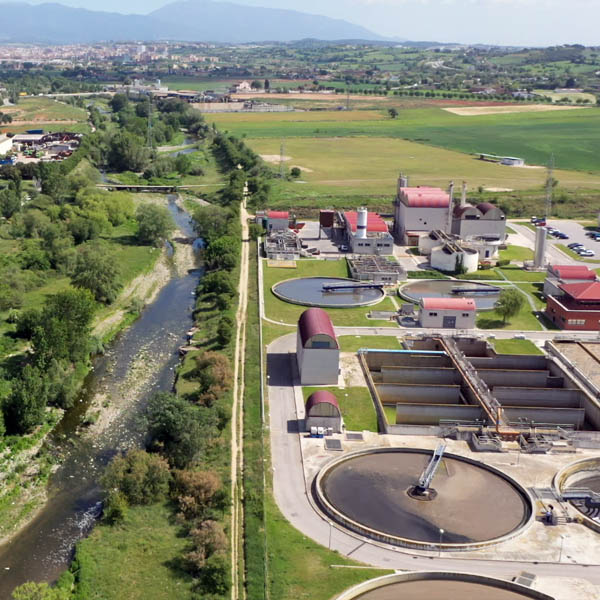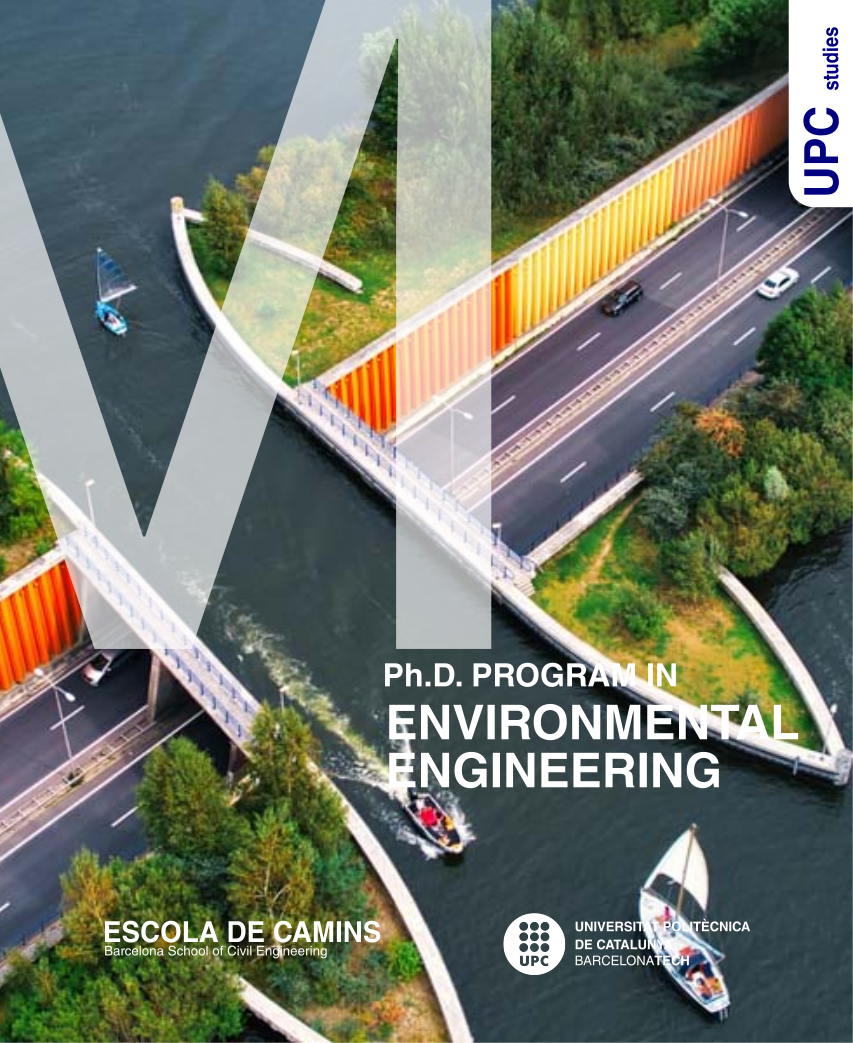Environmental Engineering (2024)

The Master's Degree in Environmental Engineering s an interdisciplinary program that delves into the fundamental concepts and criteria for understanding the relationships between human action and the environment. It provides advanced knowledge in technologies for identifying, preventing, managing, and remedying pollution in different environmental vectors, as well as fundamental tools for ensuring quality, environmental management, and sustainable development.
This master's program offers the possibility to specialize in three optional tracks:
- Environmental Technologies
- Hydrology and Water Resources
- Sustainability and Energy

Academic year starts in
Fall semester (Q1): September
Spring semester (Q2): February
Duration
1.5 years
Study load
90 ECTS (including 30 ECTS of the Master's Thesis)
Minimum academic progress
The minimum academic progress for first year students is 30 ECTS.
Delivery
On-campus
Enrolment
- Full-time
At least 30 ECTS enrolled on the first year, and up to 72 ECTS the rest of the years - Partial-times
At least 30 ECTS (and up to 60 ETCS) enrolled on the first year, and up to 72 ECTS the rest of the years
Language
Spanish
Places
40
Official degree
Master's Degree in Environmental Engineering by the Universitat Politècnica de Catalunya (recorded in the Spanish Ministry of Education's degree register)
Fees
More information about fees and payment options
More information about grants and loans
Academic coordinator
Specific admission requirements
In order to gain admission to the Master's Degree in Environmental Engineering, you must be a:
- Holder of a bachelor's degree in architecture or engineering in the areas of civil engineering, industrial engineering, chemistry, the environment, forestry, mining, physics, biology or agriculture.
- Holder of a bachelor's degree in environmental, chemical, physical, biological or geological sciences.
- Holder of a pre-EHEA Spanish degree in architecture or engineering in the areas of civil engineering, industrial engineering, chemistry, the environment, forestry, mining, physics, biology or agriculture.
- Holder of a pre-EHEA Spanish diploma in environmental, chemical, physical, biological or geological sciences.
- Holder of a pre-EHEA Spanish degree in environmental, chemical, physical, biological or geological sciences.
Candidates seeking admission who have qualifications other than those mentioned above will be reviewed by the master's degree committee with the aim of establishing the bridging courses they must take.
Students pending obtaining the degree that gives access to the master's degree
UPC undergraduate students who, despite not having obtained the bachelor’s degree, have pending the TFG and, at most, up to 9 ECTS (including credits pending recognition or transfer) or who have completed their studies, but are waiting to achieve, if possible, transversal competence in a third language. Under no circumstances will students who access this route be able to obtain a master's degree if they have not previously obtained a bachelor's degree.
Candidates from other universities who are enrolled in all the credits to complete the studies that give access to the master's degree can apply for access. Acceptance will be conditioned to the fulfillment of the general and specific access and admission requirements at the time of formalizing the registration.
You will find all the information about the general Access requirements to UPC master's programs here.
Admission criteria
The following factors or parameters are considered for admission to the Master's Degree in Environmental Engineering:
- Academic record (F1 = 40%)
Weighting as established by the Academic regulations for Master's Programs at UPC-BarcelonaTech. - Curriculum Vitae (F2 = 50%)
- Additional certified training (F3 = 10%)
The relationship between prior formation and the academic and professional competencies established for this master's degree will also be taken into account in the final weighting score.
You can check the results of the evaluation and selection of the applications for the current academic year here.
Pre-enrolment and enrolment
Check here the general admission requirements for UPC masters and information on pre-enrolment: calendar, how to apply for admission, how to reserve a place if the resolution is favourable, etc.
Starting from the 2024-2025 academic year, the Master's Degree in Environmental Engineering (2014 plan) will be discontinued and will not accept new enrollments. Those enrolled in these study plans can choose to:
- Finish the 2014 study plan (see the discontinuation schedule)
- Adapt to the 2024 study plan of the Master's Degree in Environmental Engineering (see the adaptation table)
Discontinuation schedule
| YEAR | 2024-2025 | 2025-2026 | 2026-2027 | |||
| First | 1 | 1 | 1 | 1 | 1 | - |
| Second | 2 | 2 | 2 | 2 | 2 | 2 |
| Implementation of the Master's Degree in Environmental Engineering (2024) in the indicated course. | ||||||
| Ordinary teaching of the Master's Degree in Environmental Engineering (2014) in extinction. | ||||||
| The course of the curriculum in extinction is taught in an extraordinary manner and counts as two exam calls. Extraordinary exams. | ||||||
| Course of the curriculum in extinction is not taught. Extraordinary exams. | ||||||
| Teaching of the curriculum in extinction is not taught and there are no extraordinary exams. | ||||||
Adaptation table
| 2024 | 2014 | ||
| AMPLIACIÓ DE FORMACIÓ CIENTÍFICA I TECNOLÒGICA | |||
| Modeling of biogeochemical processes | OBL | Geochemical processes | OBL |
| Energy efficiency & decarbonization | OBL | Energy & environment | OBL |
| Ecological engineering | OBL | Environmental systems | OBL |
| Climate change & global warming | OBL | Climate & climate change | OBL |
| Life cycle analysis & sustainability | OBL | Life-cycle analysis & sustainability assessment | OBL |
| Pollutants in the natural environment | OBL | Characterization, management & treatment of soil & groundwater contamination | OBL |
| ENVIRONMENTAL TECHNOLOGIES | |||
| Management of water & waste treatment plants | OPT | Characterization, management & treatment of waste | OPT |
| Environmental engineering laboratory | OPT | Laboratory of environmental engineering | OPT |
| Recovery of bioproducts & bioenergy | OPT | Biogas and biofuel | OPT |
| Nature-based solutions | OPT | Introduction to environmental biotechnology | OBL |
| HYDROLOGY & WATER RESOURCES | |||
| Environmental oceanography | OPT | Environmental oceanography | OPT |
| Urban hydrology & flood risk | OPT | Characterization, management & treatment of water pollution | OBL |
| Water resources & comprehensive management | OPT | Water of provision | OPT |
| Pollutant transport modeling | OPT | Modeling of environmental systems | OBL |
| ENERGY & NATURAL RESOURCES | |||
| Geomechanics for energy & environment | OPT | Environmental geology | OPT |
| Digitalization & artificial intelligence | OPT | Socio-environmental statistics & decision-making | OPT |
| Ecomaterials, recycling, & reuse | OPT | Ecomaterials & sustainable construction | OPT |
| Environmental project management | OPT | Management of environmental projects | OBL |
Objectius formatius
El Màster Universitari en Enginyeria Ambiental és un màster interdisciplinari que aprofundeix en els conceptes i criteris fonamentals per comprendre les relacions entre l'acció humana i el medi ambient. Proporciona coneixements avançats en tecnologies d'identificació, prevenció, gestió i sanejament de la contaminació dels diferents vectors ambientals, així com de les eines fonamentals per garantir la qualitat, la gestió mediambiental i el desenvolupament sostenible.
Sortides professionals
El Màster Universitari en Enginyeria Ambiental de la UPC és un màster estratègic i de molt alt nivell l'objectiu del qual és formar enginyers ambientals preparats per a la presa de decisions i direcció d'equips, amb coneixements científics i tècnics per a la identificació, mesura, prevenció i correcció de problemes ambientals, i amb capacitat de definició, selecció i desenvolupament de les solucions i tecnologies apropiades, d'eines tecnològiques, de gestió i de programes d'actuació per als mateixos. En conseqüència, combina de manera equilibrada matèries científiques avançades i coneixements d'enginyeria aplicats que donen com a resultat professionals capaços de resoldre problemes complexos d'enginyeria ambiental en els seus diferents vessants, o afrontar amb èxit programes de doctorat en aquests àmbits. Les empreses que contracten estudiants d'aquest màster són enginyeries i consultories ambientals, empreses constructores, administracions públiques (locals, provincials, autonòmiques, estatals) i universitats (docència doctorat) i instituts d'investigació.
Resultats de la formació i l'aprenentage
Coneixements o continguts
- Identificar, definir i proposar la solució tecnològica i de gestió apropiada per a un problema ambiental.
- Analitzar sistemes, problemes ambientals i la seva solució mitjançant models, així com avaluar-los.
Habilitats o destreses
- Aplicar conceptes científics a problemes ambientals i correlacionar-los amb conceptes tecnològics.
- Dimensionar solucions convencionals i no convencionals per resoldre problemes ambientals i plantejar-ne el balanç de massa i energia.
- Adquirir habilitats bàsiques de treball pròpies de l'enginyeria ambiental (capacitat d'organització, dots d'observació, capacitat d'interpretar la informació) al laboratori i al camp, i identificar els mètodes i la instrumentació per a la determinació de paràmetres de qualitat ambiental.
Competències
- Plantejar de manera pràctica, amb una perspectiva econòmica i segons la legislació ambiental aplicable, els instruments de gestió ambiental i d'avaluació d'impactes ambientals.
- Planificar intervencions en el medi ambient atenent paràmetres d'avaluació de projectes, desenvolupar i organitzar la documentació bàsica i analitzar-ne la viabilitat tècnica, econòmica i ambiental.
- Dimensionar solucions convencionals i no convencionals avançades a problemes ambientals i plantejar-ne el balanç de massa i d'energia.
- Realitzar, presentar i defensar, davant d'un tribunal universitari, un exercici original, realitzat individualment, consistent en un estudi o projecte integral en el camp de l'Enginyeria Ambiental, en què se sintetitzin les competències adquirides als ensenyaments, adoptant els avenços i novetats en aquest camp i aportant idees noves.
For more information on course groups, coordinators and codes check the printer version of the curriculum.
To obtain the degree, students must pass 6 elective courses (30 ECTS).
If you wish to obtain a track (optional), you must pass the 4 elective courses specific to the desired track.
COURSES | ECTS |
| First year | |
| Fall semester | |
| Mandatory | |
| 250MEA003 Modeling of biogeochemical processes | 5 |
| 250MEA005 Energy efficiency & decarbonization | 5 |
| 250MEA002 Ecological engineering | 5 |
| 250MEA004 Climate change & global warming | 5 |
| 250MEA000 Life cycle analysis & sustainability | 5 |
| 250MEA001 Pollutants in the natural environment | 5 |
| Spring semester | |
| Environmental Technologies Track optatives | |
| 250MEA006 Management of water & waste treatment plants | 5 |
| 250MEA007 Environmental engineering laboratory | 5 |
| 250MEA008 Recovery of bioproducts & bioenergy | 5 |
| 250MEA009 Nature-based solutions | 5 |
| Hydrology and Water Resources track optatives | |
| 250MEA012 Environmental oceanography | 5 |
| 250MEA010 Urban hydrology & flood risk | 5 |
| 250MEA013 Water resources & comprehensive management | 5 |
| 250MEA011 Pollutant transport modeling | 5 |
| Energy and Natural Resources track optatives | |
| 250MEA016 Geomechanics for energy & environment | 5 |
| 250MEA014 Digitalization & artificial intelligence | 5 |
| 250MEA015 Ecomaterials, recycling, & reuse | 5 |
| 250MEA017 Environmental project management | 5 |
| Second year | |
| Fall semester | |
| Mandatory | |
| Master's Thesis | 30 |
Choose the subjects you want to study and simulate how your schedule will be with the UPC Timetable Viewer:
Wednesdays from 12:00 to 14:00 there are no classes and these periods can be used for cultural activities (culture period).
The Master's Thesis is an original exercise to be done individually and presented and defended before a university panel consisting in a project in the sphere of the specific civil engineering technologies synthesising and integrating the competences acquired on the course.
Scheduled theses
These are the master's theses currently scheduled for public presentation:
Related links
Institucional information
Contact
- Admission:
admissions.masters.camins@upc.edu - Information enrolled students:
masters.camins@upc.edu
Share: